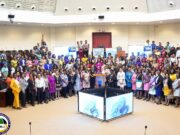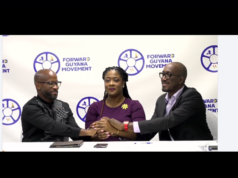Government is apparently playing the fields and analysing every possible option that could reverse the recently passed No Confidence Motion and has now posed several questions, including whether former AFC MP, Charrandas Persaud – a citizen of both Guyana and Canada – can even legally vote in the National Assembly.
On December 21, last, the APNU+AFC Coalition had confidently debated the No Confidence Motion issued by the Parliamentary Opposition, convinced that – with 33 seats compared to the 32 seats of the members on the other side of the house – they would successfully defeat the motion. However, in a shocking turn of events, former AFC Member, Charrandas Persaud, voted against his Government for the passage of the motion.
Since then, the Coalition has been struggling to grapple with the outcome. Today, in a press statement issued by Attorney General and Minister of Legal Affairs, Basil Williams, the coalition maintained that the passage of the motion would be constitutionally incorrect, based upon what they believe is the non-attainment of an “absolute majority”.
“This Government was not defeated by a majority as required under Article 106(6) of the Constitution,” Williams said in the statement. “In order for the Government to be defeated on a vote of confidence, 34 or more votes of all the elected members in favour of the motion were required instead of 33.”
In explaining Government’s rationale, Williams said that 32.5 persons represent half of the National Assembly of Guyana. However, he said, this figure is rounded up to 33 since there is no such thing as half a person; therefore, this new figure of 33 persons represents half of the National Assembly. He further emphasised that with a No Confidence Motion, a simple majority is not enough.
“It must be noted that the Constitutional requirement for voting on a motion of No Confidence is distinct from voting on the passage of legislation and ordinary motions in Parliament. The framers of the Constitution, by requiring the vote of a majority of all the elected members of the National Assembly, have set the requirement as an absolute majority. The passage of legislation and motions outside of Article 106 (6) procedurally only require a vote of those members present and voting (Article 168) i.e. a simple majority. Therefore, resolution 101 was not passed by the required majority of elected members of the National Assembly.”
However, the Coalition is not only maintaining that the number of votes required was not attained but are now saying that Persaud’s vote should not have even been considered. The Government is contending that Persaud should be disqualified as an elected member of the National Assembly, pursuant to Article 155 (1) (a) of the Constitution, since he is a citizen of both Guyana and Canada. Persaud has been serving as a Parliamentarian on the Government’s side since the Coalition took office in May 2015 and had successfully voted before the Jagdeo-sponsored motion.
Meanwhile, Government is maintaining that the motion can be reversed by the Speaker of the National Assembly. According to the Attorney General, the Speaker can “revisit and correct” any decision that is deemed unconstitutional.
“The Speaker can reconsider the resolution and reverse any decision he may have made and is not barred by the sub judice rule. This assertion is grounded in Parliamentary practice and precedent,” Williams said.
However, it appears that the Government is considering its options at the level of the Judiciary if there is no satisfaction from the Speaker of the National Assembly.
“The Judiciary, which is one of the three arms of the State, will intervene where the Constitution, the supreme law of the land, is abridged. Therefore, the Court can nullify the Speaker’s decision if it is found to be unconstitutional,” Williams maintained.
The National Assembly will convene on January 3, 2019 to deal with the “consequences” of the vote, Speaker Dr. Barton Scotland has said.
The passage of the No Confidence Motion will require Guyanese to head to the polls no later than March 2019 to vote in General and Regional Elections, more than a year earlier than originally slated.









